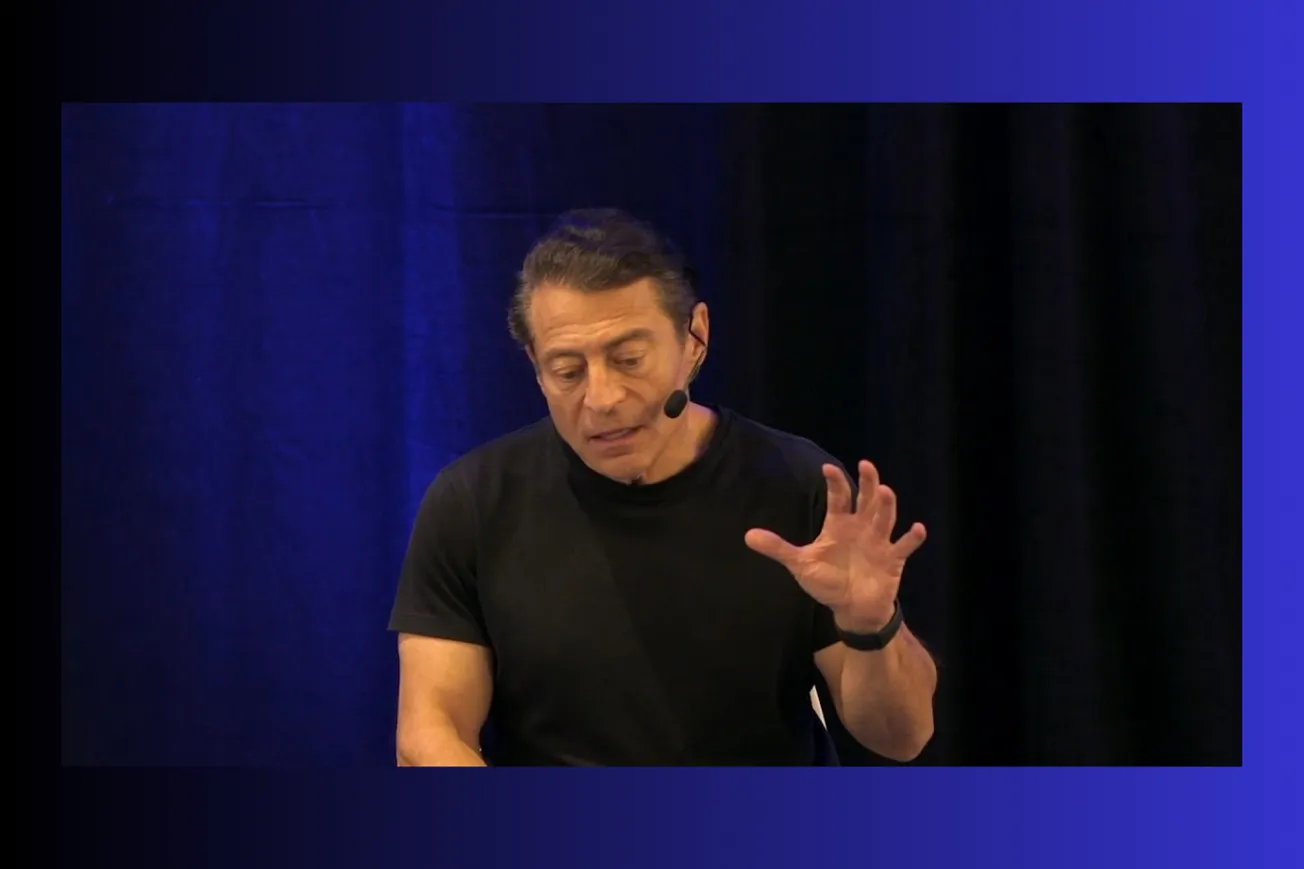Table of Contents
Here's the thing most people don't realize: we're living through the greatest transformation in human history, yet our brains are still wired for a world that no longer exists.
Key Takeaways
- Technology consistently transforms scarcity into abundance, from whale oil to solar energy, creating unprecedented opportunities for those who recognize the pattern
- Extreme poverty has plummeted from 90% to under 10% globally, while literacy skyrocketed from 15% to over 80% - data that directly contradicts mainstream media narratives
- Purpose-driven mindset beats money-driven motivation every time; companies started purely for profit tend to fail when challenges mount
- Exponential thinking means recognizing we'll experience more technical progress in the next 10 years than humanity had in the entire past century
- Moonshot mindset requires 10x improvement goals rather than 10% incremental gains, fundamentally changing how you approach problems
- Your mindset acts like a neural network shaped by everything you consume; protecting what enters your mind is as crucial as protecting what enters your body
- Linear thinking evolved for survival on African savannas but becomes a liability in today's exponential world
- The human body wasn't designed to live past 30, yet converging technologies are positioning us for potential 150+ year lifespans
- Abundance mindset isn't just optimism - it's recognizing that 8,000 times more energy hits Earth daily than humanity consumes
- Most breakthrough ideas seem crazy the day before they become breakthroughs; embracing this paradox unlocks exponential possibilities
The Technology Revolution: From Whale Oil to Fusion Energy
What's fascinating about human progress is how consistently we've solved scarcity through technology, yet somehow we keep forgetting this pattern. Think about energy for a moment. We used to literally hunt whales across dangerous oceans just to get oil for our lamps. Then we carved up mountains for coal. After that, we drilled kilometers underground searching for petroleum. Each step seemed to solve our energy problems temporarily, but also created new limitations.
But here's what changed everything: we started recognizing that Earth gets bathed in roughly 8,000 times more energy from the sun than our entire species consumes. The scarcity was never real - it was just a distribution and conversion problem. Solar energy costs have plummeted by orders of magnitude, and we're standing at the threshold of fusion technology that could make energy essentially limitless.
The same pattern emerges everywhere you look. People worry about water wars and water scarcity, but we live on what's essentially a water planet. About 97.5% of our water is salt water, 2% is locked in ice, and we fight over that remaining half percent in rivers and lakes. Yet technology now enables us to pull water directly from the atmosphere and convert that massive 97.5% of salt water into something drinkable. The scarcity mindset keeps us focused on fighting over scraps when abundance surrounds us.
This isn't just about resources - it's about recognizing a fundamental truth. Technology takes latent capacity that exists all around us and makes it usable. Once you see this pattern, you start noticing it everywhere, and it completely changes how you think about problems and opportunities.
The Data That Rewrites Everything You Think You Know
I'm going to share some numbers that probably sound wrong to you, and that reaction tells us everything about how our information environment shapes our worldview. These aren't opinions or predictions - they're documented trends that have been accelerating for decades.
Global extreme poverty has dropped from 90% to under 10%. Let that sink in for a moment. Throughout most of human history, nine out of ten people lived in what we'd consider extreme poverty. Today it's less than one in ten, and that number keeps falling.
Literacy rates have exploded from about 15% to over 80% globally, and we're approaching near-universal literacy. More kids are staying in school longer than ever before in human history. Child mortality, which used to be a coin flip - literally a 50/50 chance your child would survive to age five - has dropped to around 4% in most of the world. Some countries didn't even name their children until age five because the emotional pain of loss was so common.
Here's something that might shock you even more: global fertility rates are dropping so fast that we're heading toward an underpopulation crisis, not overpopulation. Back in the 1950s, families averaged over five children. The replacement rate is 2.1 children per family, and we're now at 2.4 and dropping rapidly. Countries like Italy, China, South Korea, and Japan are seeing their populations shrink dramatically.
Life expectancy has doubled from the 30s to late 70s and 80s across most of the world. For all of human history until very recently, people died young. We've literally doubled the human lifespan in just a few generations.
Daily calorie supply has increased steadily for 70 years. Deaths from malnutrition have plummeted. We actually have plenty of food on the planet - distribution remains the challenge, not production. Even reported crime rates in the US are down 50% from their peaks. Conflicts have become less deadly, despite what you see on news networks.
Why does this data feel counterintuitive? Because our brains evolved to pay attention to threats and problems. Media companies figured out that fear and outrage capture attention better than good news, so that's what dominates our information diet. But when you look at the actual long-term trends, humanity is experiencing unprecedented prosperity and progress.
The Five Critical Mindsets for Exponential Leaders
What separates truly extraordinary leaders from everyone else? When you study figures like Gandhi, Martin Luther King Jr., Elon Musk, or Steve Jobs, it wasn't their access to technology, money, or connections that made them successful. Strip all that away, and if they retained their mindset, they'd rebuild their success. That's the power of the right mental operating system.
Purpose-Driven Mindset: Finding Your Massive Transformative Purpose
Mark Twain nailed it when he said there are two important days in your life: the day you were born and the day you find out why. When you're driven by something bigger than yourself, there's literally nothing you cannot accomplish.
I've started 27 companies in my career. On two occasions, I launched businesses purely because I thought they'd be great ways to make money. Both failed spectacularly. Here's what I learned: everything looks like a fantastic opportunity from a distance. The closer you get, the more you see all the problems, challenges, and obstacles. Unless you're driven by genuine purpose, you'll give up before you succeed.
Purpose becomes your fuel at 3 AM when everything seems to be falling apart. It's what pushes you through the inevitable failures and setbacks that every meaningful venture encounters. Your business succeeds by overcoming hurdle after hurdle, and intrinsic motivation beats extrinsic motivation every single time.
A Massive Transformative Purpose can emerge from two places: awe and amazement at what's possible, or anger at injustices you refuse to tolerate any longer. Both work. Martin Rothblatt started with a high school biology book when her daughter was diagnosed with a fatal lung disease. She built a $5 billion company called United Therapeutics while saving her daughter's life. When you're driven by necessity and purpose, you discover capabilities you never knew you had.
Exponential Mindset: Thinking in Terms of Billions
We're living in a world where single individuals can positively impact the lives of a billion people. That's not hyperbole - it's mathematical reality in our connected, technology-enabled world. But most people can't wrap their heads around exponential change because our brains evolved for linear thinking.
On the African savanna 200,000 years ago, nothing changed decade to decade in an exponential fashion. The best survival strategy was linear thinking: "Can I get to that tree before the lion gets to me?" That's how our minds are wired, even though we now live in an exponential world.
Ray Kurzweil predicted in 1999 that we'd achieve human-level AI by 2029. People called him insane because between 1956 and 1999, AI had made almost no visible progress. They could only imagine that slow progress continuing indefinitely. But exponentials are deceptive in their early stages.
The first digital camera from Kodak took 0.01 megapixel images. The next year: 0.02 megapixels. Then 0.04, 0.08... it all looked like nothing was happening. When the inventor showed it to Kodak's board, they dismissed it completely. "We're in the paper and chemicals business," they said. "There's no money in digital." Kodak went bankrupt while digital photography conquered the world.
Ten doublings gets you 1,000x improvement. Twenty doublings: a million times better. Thirty doublings: a billion times improvement. We're experiencing as much technical progress in the next decade as humanity had in the entire past century. That's the gap between the Ford Model T and Tesla's Cybercab.
Moonshot Mindset: 10x Instead of 10%
Most companies obsess over 10% improvements. Ten percent more revenue, 10% lower costs, 10% more customers. That's incremental thinking, and it keeps you trapped in existing paradigms.
Moonshot thinking targets 10x improvement - 1,000% better, not 10% better. As Burt Rutan, who won the Ansari X Prize, put it: "The day before something is a breakthrough, it's a crazy idea." If it wasn't crazy yesterday, it wouldn't be a breakthrough today.
Here's how you build moonshot capabilities in your organization. First, don't kill the goose laying the golden eggs. Keep your existing profitable operations running smoothly. But create a separate moonshot organization with different people, different rules, and different expectations.
Your moonshot team leader needs one clear mandate: "If I catch you doing anything incremental, you're fired. You're here to achieve 10x improvement." That team reports directly to the CEO and needs to be physically separated from the main organization. Why? Because the main organization will tell them they're crazy every single day. Moonshot thinking threatens the existing business model, triggering an organizational immune response that kills innovation.
Steve Jobs understood this completely. When creating the Mac, he didn't work inside Apple headquarters. He rented offices miles away, put a pirate flag on the roof, and told his team: "We're pirates. Leave us alone." Lockheed's Skunk Works followed the same model when developing the SR-71 and breakthrough fighter jets during World War II.
When Astro Teller at Google X wants 500 miles per gallon instead of 55, you can't get there through incremental engine improvements. You need a clean sheet of paper and completely different thinking. That's exactly what Elon Musk did with SpaceX and Tesla - he reinvented entire systems from the ground up.
Building Organizations That Think in Decades, Not Quarters
The longevity mindset fundamentally changes how you approach business and life decisions. As one speaker put it: "Life is short until you extend it." The human body evolved for a world where living past 30 was remarkable. A hundred years ago, average life expectancy was around 40.
But we're entering what many call the healthspan revolution. Converging technologies - AI, single-cell sequencing, CRISPR gene therapies, new materials science - are positioning us for potentially massive extensions of healthy human lifespan. Some researchers seriously discuss the possibility of 150-year lifespans becoming normal.
Why does this matter for your business strategy? Because if you don't believe longevity is real, why would you invest in long-term thinking? Why exercise, eat well, or make sacrifices today for future benefits? But if you recognize we might be living and working for 100+ years, everything changes. You start thinking in decades rather than quarters.
I remember a friend who died from AIDS just six months before the life-saving retroviral drugs became available. He missed the revolution by half a year. Don't be the last person who doesn't recognize the healthspan revolution happening right now.
The mindset shift here isn't just personal - it's organizational. Companies that think in 50-year timescales instead of quarterly earnings reports will build entirely different kinds of sustainable competitive advantages. They'll invest in different technologies, develop different relationships, and create different kinds of value for their customers.
Protecting Your Mental Operating System
Here's something most people never consider: your brain is essentially a neural network with 100 billion neurons and 100 trillion synaptic connections. That network gets shaped by everything you read, see, hear, and everyone you spend time with.
We've learned not to eat sugar and to eat our vegetables because what goes into our bodies affects our physical health. The same principle applies to our minds, but most people pay zero attention to their information diet. What you let into your mind literally shapes your mind's health and your default responses to opportunities and challenges.
If your mindset is your most important asset as a leader - and I believe it is - then you need to be incredibly intentional about what shapes it. The challenge is that our default programming pulls us toward fear and scarcity. That's how we're wired from 200,000 years of evolution on dangerous African savannas.
Fear and scarcity put you back on your heels. You become defensive, stop learning, stop creating, stop engaging with opportunities. But abundance mindset positions you to see possibilities, take calculated risks, and build something meaningful.
Ray Kurzweil talks about the law of accelerating returns - computational power per dollar growing exponentially. But here's what's really interesting: when you plot exponential growth on a logarithmic scale, you should get a straight line. Instead, the curve bends upward, meaning the rate of technological acceleration is itself accelerating. We're in a super-exponential phase.
The cost of technology keeps plummeting while capabilities explode. This creates unprecedented opportunities for anyone willing to think exponentially and act on abundance rather than scarcity assumptions.
Your challenge is simple but not easy: choose the mindset you want, then consciously consume information that reinforces that mindset. When problems or opportunities appear, your neural network's pattern-matching will kick in automatically. Make sure those patterns serve your highest goals rather than your oldest fears.
We're living through the most abundant time in human history, with access to tools and opportunities our ancestors would consider godlike. The question isn't whether abundance exists - the data proves it does. The question is whether you'll train your mind to recognize and act on that abundance, or let fear and scarcity thinking limit what you build.





